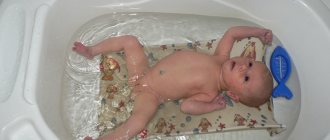Creating the right mood
Pregnancy and childbirth are behind you, and after all the trials you have become a mother. The birth of a baby has completely changed your life, and the incredible number of different things to do, problems, and fears makes your head spin. How to enter this new world of motherhood?
First of all, it is incredibly important to create a positive attitude. Yes, everyone says that being a mother is very difficult. But you have no idea how enormously important your attitude to everything related to motherhood is. Believe me, you are quite capable of becoming a happy mother who perceives many things easily, without losing attentiveness and responsibility, and does not at all feel an unbearable burden on her shoulders. How to achieve this?
1) Moderate your perfectionism. Don't expect yourself to be a perfect mom or your baby to be a perfect child. Don’t expect that every day will go like clockwork. You won't be able to control everything. Just decide for yourself that you will not dramatize or exaggerate various events that can be called troubles. If your baby is fed, in a dry diaper and you are monitoring his health, then everything is going great. Keeping your house in order, getting your hair and nails done, getting a three-course meal on the table every day - none of this should be at the top of your list of priorities right now.
2) Sleep when the baby is resting. Check out our sleep resources to help your baby sleep safely. The most important thing for you, in addition to the physical condition of the baby, is your well-being. Lack of sleep not only spoils your mood and deprives you of strength, it leads to health problems.
3) Treat yourself with care. Almost every second woman experiences emotional decline on the 3rd – 4th day after childbirth and on other days. This is due to changes in hormonal balance in the body and will inevitably pass. Don't fight the feelings, even unexpected ones, that may come over you. Within 3 weeks after giving birth, your body will adapt to the changes and you will feel better.
4) Gradually engage in recovery after childbirth. We talk about all the details here.
These are changes that develop slowly: it is important to gradually adjust your diet and start engaging in a form of physical activity that is enjoyable for you. The best thing to do now is a fitness club or group classes: this way the incentive to get back in shape will be stronger.
5) Communicate. Many young mothers feel lonely: their life consists solely of caring for the baby. Only you can break your social isolation, and the sooner the better. Chat with mothers at playgrounds, let your circle of acquaintances expand and include more women with children.
6) Remember about contraception. 6 weeks after giving birth, a woman is usually allowed to have sex. A nursing mother may become pregnant again, so it is important to take precautions.
7) Have fun. Night feedings, fatigue and lack of sleep are hard, but try to enjoy the wonderful moments of life even now, during a difficult period. Soon you will miss him and communicating with a very tiny baby who is growing so quickly.
 Don't compare yourself to other moms. If there are mothers around you who you think are somehow better than you, just stop thinking about it. You do everything as best you can, and we can only be proud of you. You are the best mother for your baby, believe me, he has no doubt about this!
Don't compare yourself to other moms. If there are mothers around you who you think are somehow better than you, just stop thinking about it. You do everything as best you can, and we can only be proud of you. You are the best mother for your baby, believe me, he has no doubt about this!
9) Give yourself a weekend. A day off means that you can just relax and relax with your baby, without trying to be not only the best mother, but also a wife and housewife. Perhaps on such days someone will agree to stay with the baby while you go for a pedicure or to a cafe with a friend. After all, you spent nine months creating a small miracle and deserve a break!
Mom of a preschooler
- English from the cradle: pros and cons
- Is it necessary to go to the sports section?
- How to choose a sports section for a preschooler
- How to protect your child from adult content on the Internet
- At what age do I leave my child at home alone?
- How to choose a good school for your child
- Should I help with homework and to what extent?
- 5 mistakes our parents made in raising them
- 5 best things my parents taught me
- How parenthood has changed me
- What do I want for my child when he grows up?
- The most important life skills a child should learn
We accept help
Decide in advance who will help you and how. Options: husband, grandmother, girlfriends, hired nanny, cleaner or au pair. Even though you may be in a bad mood, you will appreciate the services of your loved ones. However, many of us find it difficult to ask another person for something. And some will refuse any help “until the last moment.” Treat accepting care as a developing psychological exercise and do it. Remember that everyone who wants to help you does so voluntarily, so just enjoy the care directed towards you.
- Everyone needs assistants, regardless of physical fitness and level of endurance. Sometimes it is simply necessary to be distracted from routine daily tasks in order to return to them with renewed vigor. We need rest or the opportunity to switch to another activity from time to time. When a newborn arrives in the house, even going to the shower becomes a luxury for the new mother. And if young parents want to go to the cinema or theater or just take a walk together, then they can’t do it without help.
- It’s not easy for every mother to leave her baby for the first time, even with a grandmother or sister. Firstly, it is psychologically difficult to part for the first time, even if only for a couple of hours, with a child with whom the woman was inextricably linked for nine months before giving birth and the first months after. Secondly, it is scary to trust your treasure to someone else. But this fear must be overcome - it’s enough to simply believe that relatives, or friends, or a nanny will take care of the child in the same way as you do. Remember that your mother raised her children safely, and your sister raised hers, and they all grew up happy, healthy and satisfied with life. So why can’t they cope with your child? We must learn to trust and accept help with gratitude. This will make your life a lot easier.
- How to filter out useless help? Yes, this happens too. Sometimes older relatives, not wanting to keep up with the times, continue to impose outdated ways of caring for a child on young parents. Diapers instead of disposable diapers, bathing in boiled water, washing floors three times a day, mandatory two hats in warm summer weather. You need to learn to filter such help. It is not necessary to enter into a long argument, explaining that life does not stand still - sometimes it is enough to smile sweetly, thank you for the advice and do it your way.
Morning toilet - tip 3
Morning toilet consists of washing the eyes and nose. Take any bowl, preferably a small one, it will be more convenient, and pour water into it - boiled, cooled to room temperature. Tear off a piece of cotton wool, wet it and wipe each eye from the outer to the inner edge.
After this, use the same cotton wool to roll a flagellum and carefully clean your nose. Remember that cotton swabs can only be used from one year onwards.
Instead of cotton wool, you can use cotton pads. They will make it much easier to tidy up your baby after sleep.
In addition, it is necessary to treat the umbilical wound:
- Drop hydrogen peroxide with a pipette.
- Remove “garbage” with one cotton swab.
- Apply brilliant green with another cotton swab.
How to run a house when you have a baby at home
• Ironing is optional.
Indeed, it used to be believed that it was necessary to iron children’s clothes, and on both sides, in order to kill all germs. Nowadays there is a more common opinion that, firstly, it is definitely not necessary to destroy all germs, and secondly, it is better to allow yourself to rest for an extra half hour than to spend this time on ironing. The baby, and all other family members, need a rested, well-slept mother and wife much more than carefully ironed rompers and undershirts.
• Daily wet cleaning is not necessary.
The house should be clean, but fanaticism is not needed. You don’t have to clean up yourself—you can ask your loved ones. A cluttered home doesn’t just make mom sad—it’s harmful to the child’s health. A clean floor, fresh air and no dust are what both you and your baby need.
• In bad weather you can walk on the balcony.
Pediatric doctors usually recommend walking your baby twice a day in good weather. But everything is individual, and if it’s hard for you to pull out the stroller every time or you just have a lot of housework to do and don’t want to go out anywhere, then your child can easily take a walk on the balcony or loggia with the windows open. This method has been used by more than one generation of mothers. It is especially good in rainy, chilly weather, when you are absolutely not in the mood to even look outside. The child in the stroller sleeps peacefully on the balcony or loggia, and at this time the mother can go about her business or just relax.
• Shop online.
You can make your life easier, for example, by purchasing groceries, diapers and baby food online. Now many stores, including children's, offer home delivery. Utilities and telephone payments can also be paid online, and this is convenient primarily for young mothers who do not have the opportunity to go out without a stroller.
Let all the necessary things be where it is convenient for you. Diaper cream, high chair, essentials should be in the places where you need them. Little things like this save energy.
Don't write beyond your competence
I encourage you to always approach your “mom” blog with responsibility and caution, and always ask yourself two questions:
- Who can be influenced by my advice?
- Do I have the competence to write about this?
- what if I'm wrong?
Let's say your child has chickenpox and you decide to talk about its treatment. Stop and think, do you have the competence to write about this? You are a doctor? Are you ready to share the moral responsibility for incorrectly given advice? Think about what if your advice leads to a complication of the illness of some child of a trusting mother?
The same applies to the extremely pressing issue of vaccinating children or psychological advice to parents. At least for a second, think about what the consequences of an incorrectly given recommendation could lead to: disability, psychological trauma. Of course, the final decision always lies with the parent, but part of the blame for the sad outcome will always lie with you, as the person who convinced the parent to make the mistake.
Therefore, choose topics for your blog wisely, do not go beyond the boundaries of your experience and do not give advice that requires special skills and knowledge.
Caring for your baby without any hassle
We describe in detail how to properly care for a baby in our articles about caring for a newborn and a child from 2 months to 4 years. What else is important?
1) Keep a diary. Write down your feelings as a mother, as well as everything related to the baby, down to how many diapers have been used - then it will be easy for you to monitor the health of the baby, and if necessary, you will be able to answer any question to the pediatrician, even if you forgot something due to lack of sleep.
2) Arm yourself with knowledge. The best thing that can be counteracted by anxiety about the baby’s health is knowledge of what happens to him after birth. A newborn asks for breastfeeding every 1.5 - 2.5 hours, he needs about 8 diapers a day, and he has bowel movements about 3 times a day. Spitting up is normal as long as your baby is gaining weight as expected.
3) Buy useful devices for your baby. Yes, most of the devices that are sold in a children's store will not be useful to you. But some of them are useful!
• Nibbler. This modern device is very useful when the baby is ready to get acquainted with fruits or vegetables, but is not yet able to chew solid food. A nibbler is a mesh bag with a handle. It contains fruits or vegetables, which the child sucks through the mesh. This way he will gain the first skills of chewing food and will not choke on large pieces. The nibbler's mesh is removable and can be replaced if necessary.
• A folding playpen bed will come in handy if you are invited to an overnight stay or to your friends’ dacha, but there is no crib there. To avoid having to cancel your trip, you can purchase a playpen bed. When folded, it fits into a small case the size of a sports bag and can be easily unfolded if necessary. In the playpen, the baby will be able to play and sleep while parents communicate with friends. At home, it will also come in handy as a place for an older child to play when the mother is busy and cannot monitor his movements around the apartment. However, remember that under no circumstances should you limit your baby’s physical activity so as not to interfere with its development. If he has grown and wants more space, you no longer need a playpen.
• Video baby monitor. A video baby monitor is a surveillance camera that transmits an image to a monitor or even a smartphone. A very convenient thing for those cases when the baby is resting, and you need to go about your business without constantly listening to sounds from the nursery. Sometimes a young mother cannot even afford to take a bath while the child is sleeping, for fear of not hearing him wake up. With a video baby monitor, you can forget about such fears.
• Aspirator or nozzle ejector. When a child has a stuffy nose, this is a reason to be nervous for everyone - both the baby and the parents. Young children do not yet know how to blow their nose, and nasal congestion causes severe discomfort. An aspirator very easily helps to cope with this problem; you just need to get used to it a little - and your little nose will breathe again.
• Play mat. In any children's store you can find a huge number of play mats of different shapes and contents. They are round, rectangular, square; with squeakers, rustling elements and rattles; expensive and cheap. But the most important thing is that such a rug can keep a child occupied for some time while the mother does household chores. For those who have already learned to crawl and roll over, a convenient option is a rug with rising sides. It folds up easily and can be taken with you on a visit or on a picnic.
• Electronic baby thermometer. Electronic thermometers can be ear or forehead. This is an indispensable thing for a small child, because they do not contain mercury and allow you to measure temperature quickly (literally in one second), accurately and safely.
Going to bed - tip 8
Almost all breastfed babies fall asleep in their arms. If the baby is bottle-fed, rock him and then transfer him to bed.
You need to lay him on his side, never on his back, as in this case he may choke on vomit. To prevent your child from rolling over into a dangerous position, place a pillow or folded blanket on the side. It is also necessary to shift from one side to the other several times a night. Otherwise, you may encounter a problem such as deformation of the skull bones.
Swaddling will not be superfluous. The fact is that babies are afraid of their own arms and legs, so they often wake up without a diaper.
About the bed. A baby under the age of 3 months should rest in a cradle, not in a bed. It will be more comfortable for him, which will have a positive effect on both the duration and quality of sleep.
And don't forget to ventilate the room. Suitable air temperature is 20 degrees Celsius .
Where to go with a small child
The birth of a baby is not a reason to limit yourself in available entertainment. If previously visiting a museum with a small child seemed impossible, now more and more mothers prefer an active lifestyle with their baby. In shopping and entertainment complexes there are mother and child rooms where you can comfortably change your baby’s clothes and even feed him. Changing tables for small children are also beginning to appear in modern exhibition centers. An increasing number of museums are equipped with ramps for easy lifting of strollers.
The Moscow metro has recently also introduced a service to help passengers with limited mobility. If you find it difficult to control a stroller in the subway, go up and down escalators, etc., just call the passenger mobility center and agree on a travel time that is convenient for you. At the appointed hour, you will be met by service employees who will take care of all the worries about lifting and lowering the stroller in passages and on escalators for the entire duration of your stay in the metro. The service is absolutely free.
And now about where you can go and what to do with a child under one year old.
1) Excursions. The stroller will not be a hindrance to a walk around interesting places in your locality or to a bus excursion out of town. On the contrary, the younger the child is, the higher the likelihood that he will sleep throughout the journey. Also an indispensable thing for excursions is a sling or ergo backpack. The baby is comfortable in it, and the parents’ movements are not constrained. The backpack fits both mom and dad equally well, which means that if necessary, parents can switch to give their backs a rest.
2) Museums and exhibitions. Not all museums can be accessed with a stroller, so for such trips a kangaroo, baby carrier or sling will be very useful. In this position - close to mom or dad - the baby will behave calmer and is more likely to let you enjoy visiting a museum or exhibition. Here again the rule applies: the younger the child, the easier it is to go with him to public places. First, babies sleep longer than older children; secondly, the lighter the baby, the less the load on the back of the parent carrying the backpack.
3) Travel. Traveling with a small child is not at all as scary as it might seem at first glance. The main thing is to think carefully about how you will entertain your baby while traveling, how many diapers and wet wipes to take with you on a plane or train, and how to distract your child if he suddenly starts acting up. A must-have item when traveling is a favorite toy; it will remind your baby of home and soothe him in moments of anxiety and discomfort. In something like travel, it’s enough to adapt to the schedule of your little tourist, and then you can enjoy your trip together and even have a good rest.
4) Study. As the practice of many young mothers shows, it is quite possible to combine study and motherhood, and from the very first days of the baby’s appearance in the house. Often women consciously use the time of maternity leave to acquire a new profession or master an interesting craft. The main thing is to properly organize your day, adjusting to your baby’s schedule. Walking time can be used to read educational literature, daytime sleep hours can be used to write essays or prepare for tests. If a mother seriously intends to continue or start her studies while she is on maternity leave, then it would not be a bad idea to turn to relatives for help; it will be especially needed during the sessions. Be aware of the availability of free online courses and universities such as https://www.coursera.org/ or https://www.duolingo.com/.
Please do not be upset if, in a museum or other public place, you encounter unfriendly behavior from others, for whom the slightest sound emanating from a child is a reason for comments or other manifestations of dissatisfaction. Do not try to enter into a dialogue with a poorly educated person, just try not to pay attention to him. The culture of communication in the country will gradually improve.
How to do everything and not forget about anything
With its appearance, a new family member adds a huge number of new tasks and responsibilities to parents. Now you need to plan trips to the clinic to see different specialists, purchase children's hygiene and nutrition items, and do not forget about daily walks in the fresh air and about your personal affairs. In the first months, it seems that the cycle of new troubles has turned a previously measured and calm existence into chaos, but this is only at the beginning. Following simple rules will help you organize your life in these difficult conditions.
1. Make a to-do list for the week. This could be meeting a friend, visiting relatives, buying a child's car seat, going to a museum, or writing an essay. The more carefully you plan your affairs and follow a schedule, the more orderly and calm your life will become.
2. Learn to plan your purchases. It is best to calculate in advance how many diapers and jars of baby food you need to buy for the week so as not to run to the nearest store every day. It will be great if you also manage to plan the purchase of groceries for the whole family. This will save you a huge amount of time in the future.
3. Keep a calendar of doctor visits. In the first year of a child’s life, you will have to visit doctors very often. Monthly examinations with a pediatrician, constant visits to various specialists, countless tests and vaccinations. In order not to get confused in this kaleidoscope of medical services, you can create a calendar in which you will mark the days of visiting doctors and the approximate dates of tests. This way you won't miss a single post.
It's only begining! With the birth of a child, life does not end, but, on the contrary, it becomes brighter, more interesting and multifaceted. It is important not to limit yourself to the four walls of the apartment and worries about the baby, not to forget that, in addition to the child, there is also family and friends who also need to communicate with you. And most importantly, remember that, despite all the difficulties, you will succeed!
Feeding - tip 6
If there are no contraindications, then the baby should be breastfed. Moreover, until six months it is not recommended to give anything other than mother's milk, not even water, especially juices and fruit and vegetable purees.
You need to feed your baby according to the “first requirement” principle. As soon as you hear him crying or showing concern, offer him food. You should not show initiative in this matter, especially when taking it off the breast - the child knows how much food he needs.











